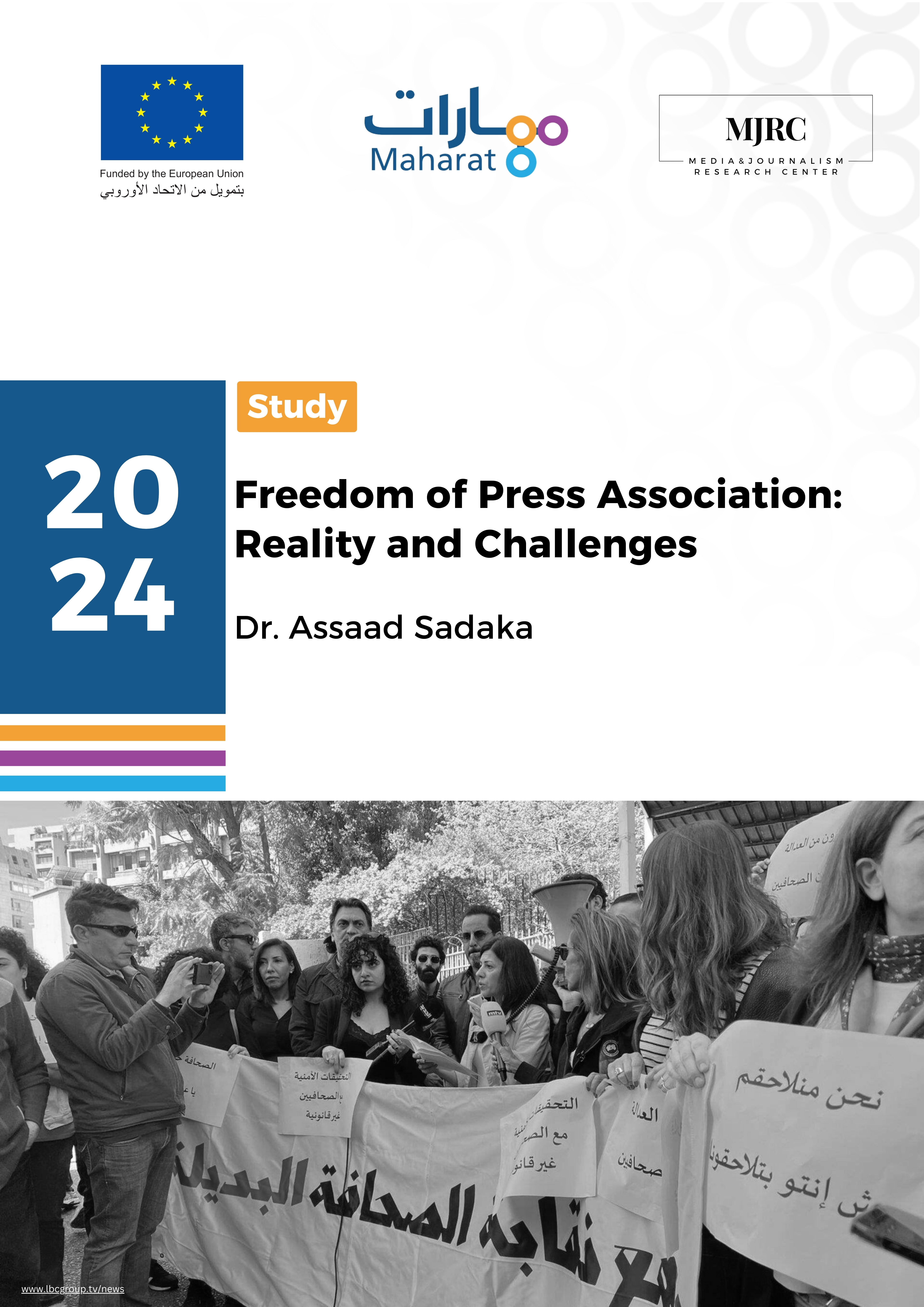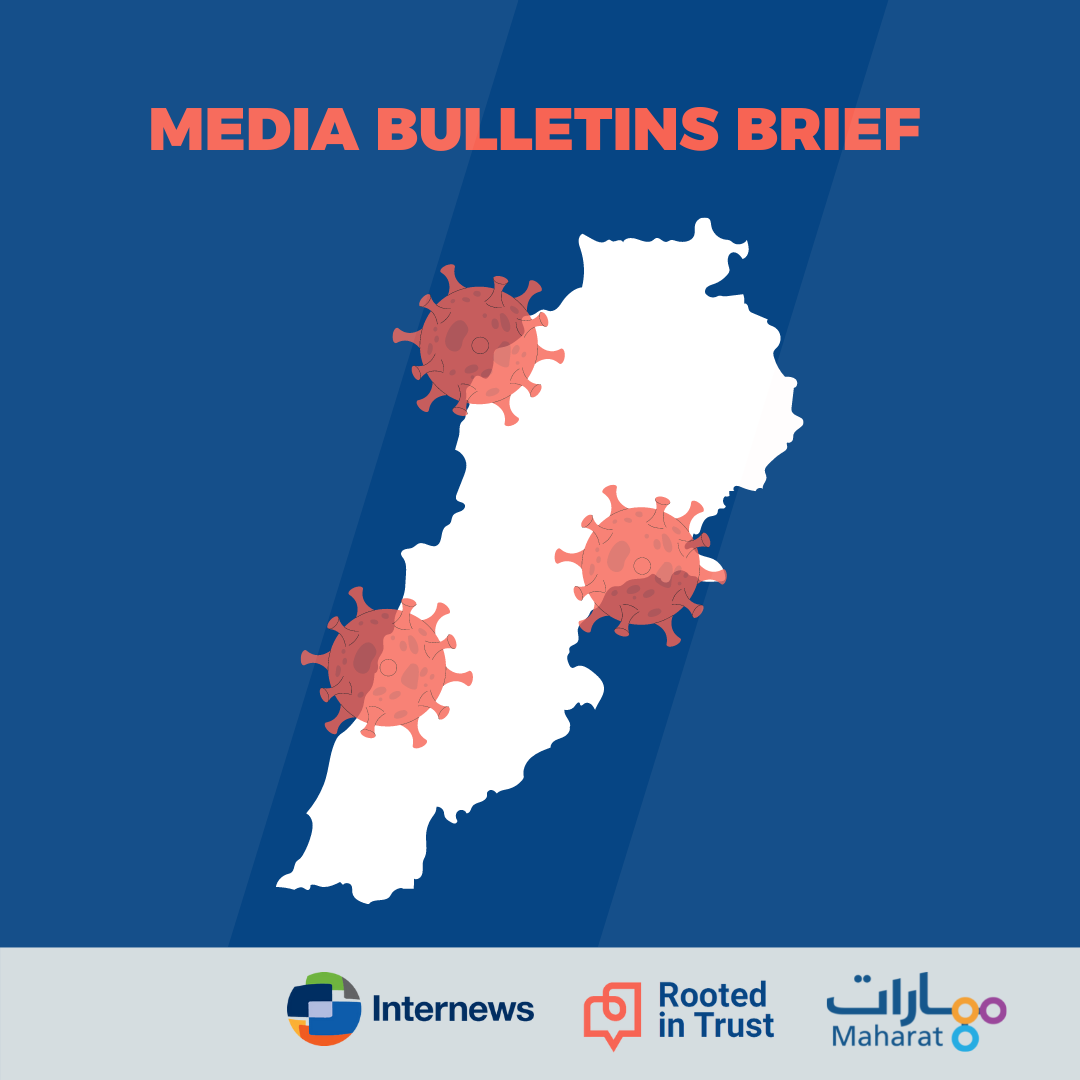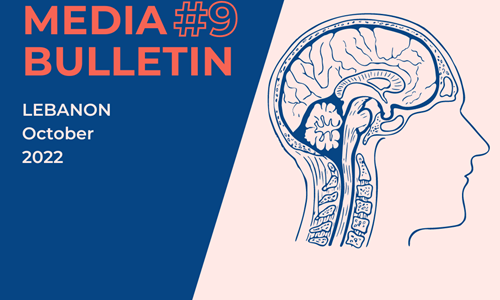
Freedom of Press Associations
"Freedom of Press Association: Reality and Challenges” a study by Dr. Assaad Sadaka, Chair person of Communication Arts Department Lebanese International University, examines the state of syndicates and associations under the current law, which still provides a primitive definition of journalism and journalists. Most of its provisions focus on newspapers, printed materials, and publishing houses, without addressing the developments in visual and audio media or the transformations brought by digital media. There are no clear laws governing the work of electronic websites, which have grown in recent years and now employ dozens of journalists and media workers without any clear legal framework that defines their operation or provides a legal description and framework for their employees. This is especially problematic since the press law used to prosecute journalists is not suitable for electronic platforms that lack legal personality and identification.
The study revealed the depth of the crisis journalists face on all levels, in the absence of any social or economic protection, and the inability of existing syndicates to fulfill this role. Many media workers have lost their jobs without receiving the compensation they are entitled to. Additionally, many are not registered with social security and receive salaries that do not ensure a decent living. Consequently, many media professionals have had to seek additional jobs and income sources alongside their media work to secure financial stability, leading to political and sectarian alignments as means to achieve their political, physical, and material security, and possibly a sense of job security to avoid arbitrary dismissal.
The study concludes that these issues necessitate the creation of modern laws that keep pace with rapid developments and redefine media work mechanisms to protect journalists' rights. These laws should align with the transformations on the ground, especially the new landscape of the wide media space, including written press, visual and audio media, and digital media, as well as the growing social media platforms. The role and influence of these platforms are increasing day by day.
To access Dr. Assaad Sadaka’s study:
Freedom of Press Association: Reality and Challenges
"Associations of Journalists and Their Role in Protecting Press Freedom in Europe" a study by European expert Dr. Judith Pies from the European Media and Journalism Research Center, discusses the definition of journalists in EU countries where "journalist" is not a protected professional title. There are no legal definitions of journalism in the EU, leaving courts to decide whether an issue is journalistic.
The study outlines the elements considered in defining journalists and the importance of syndicates in media institutions that care for journalists. Their tasks include:
- Representing media employees.
- Providing services to members, such as legal consultations, retirement insurance, and continuous training.
- Establishing and operating media councils and codes of ethics.
- Participating in media policies (they play an important role in media policies and codes of ethics).
- Communicating with members and between members and the community.
The paper offers an overview of good and bad practices in journalistic associations in the EU, which can serve as inspiration in the Lebanese context. Based on this, it proposes a set of general recommendations, most notably the adoption of a clear definition of a journalist and who should receive a press card to ensure the freedom to inform the public without pressure or influence from the state or other authorities. Membership in journalistic associations should be open and accessible to all working in journalism, especially young journalists and those in related fields. The paper also suggests networking journalists with associations domestically and internationally, using available resources to raise awareness, provide training, and obtain legal advice or technical support.
To access Dr. Judith Pies’s study:
Associations of Journalists and Their Role in Protecting Press Freedom in Europe
The findings of both studies conducted by Dr. Assaad Sadaka and Dr. Judith Pies, as well as the conclusions of a seminar organized by Maharat on July 18, concerning media syndicates in Lebanon and the freedom of press associations, were relied upon to prepare a standard setting document summarizing best practices related to the freedom of press associations.
The standard setting document includes recommendations for authorities to issue a new media law that considers developments in the concept of journalistic work, including the definition of journalists, media institutions, journalistic activities, and syndicates assemblies, as well as the challenges journalists face in protection and enhancing economic, social, and legal guarantees to ensure their freedom and independence. Additionally, efforts should be made to propose laws and suggestions for funding media institutions in a way that prevents their influence by political and electoral money and guarantees free associations’ work.
The media sector should reconsider the structure and powers of existing media syndicates and review the commitments of these associations and institutions towards their members, ensuring the regular work of journalists, securing their rights, and allowing for the consecration of the associations’ freedom, while detaching syndicates activities from sectarian and political dependencies.
The international community should benefit from international expertise in regulatory laws for journalists' freedom and their right to be part of the associations, and communicate with international journalistic syndicates to join and cooperate with them in various fields.
To access the standards setting document on "Freedom of Press associations" click here.
These studies are part of the media reform studies series under the Academic Exchange Program between Maharat foundation and Media and Journalism Research Center, as part of the "Media Reform to Enhance Freedom of Expression in Lebanon" project in collaboration with Legal Agenda and Media and Journalism Research Center, with the support of the European Union.





